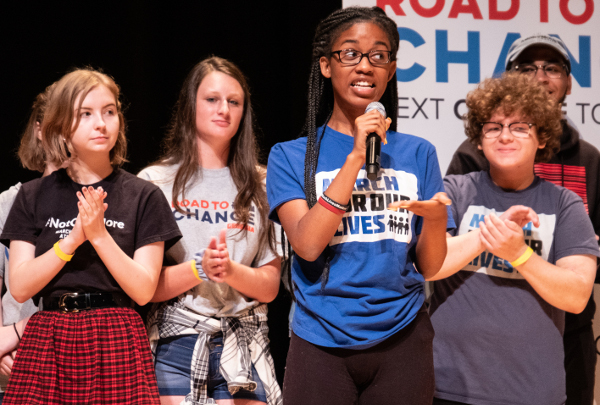
PHOTO/JOHN RAMSPOTT
This year, the political primary season has become a summer of discontent. In June, the stunning victory of a 28-year-old working-class woman over a New York City political hack caught the attention of the entire country. Alexandria Ocasio-Cortez won the Democratic nomination for Congress from New York City’s 14th Congressional District because she talked about the burning issues that people care deeply about: health care, jobs, affordable housing, and an end to attacks on immigrants.
Almost a third of the states will hold primaries in August and September, and other upsets seem possible. A strong group of candidates for seats in the U.S. Congress are sounding themes similar to those championed by Ocasio-Cortez. They are calling for universal health care, a $15 minimum wage, affordable housing, free public education and an end to the persecution of immigrants.
Across the country, we are seeing a surge in interest in the elections among many as people express their demand that the government provide for people’s basic needs. Across the country, progressive candidates have stepped forward to challenge entrenched political hacks, often incumbents from big-city Democratic Party political machines that stand in the way.
Boston City Council member Ayanna Pressley is running for the U.S. Congress in Massachusetts, emphasizing the extreme economic disparity in her district, which stretches from Boston’s Back Bay to the working-class neighborhoods of Dorchester and Roxbury. In Missouri, Cori Bush—a nurse and mother—ran for Congress on a platform calling for free college tuition for community colleges and state universities. A community activist, Bush marched in Ferguson to protest the police killing of Michael Brown, suffering police brutality herself in the process. In Washington state, Sarah Smith is running for the U.S. House of Representatives on an anti-war platform. Kerri Evelyn Harris, an Air Force veteran running for the U.S. Senate in Delaware, also champions an anti-war position. In Hawaii, Kaniela Ing is running for the U.S. Congress calling for a universal basic income and Medicare for all. Those are just a few of the candidates running; there are numerous others campaigning for offices at the national, state, and local levels.
All this is a veritable sea change from the days when many incumbents ran unopposed in the primaries. The current summer of political discontent could lead to an autumn of opportunity if fighters for justice at the grassroots level are able to utilize these campaigns as vehicles to highlight the demands of the working class. The situation is in flux. The corporate media has discovered the different progressive campaigns and is working overtime to mock or demonize them. While the mainstream media focuses on the personalities or the organizational affiliations of these progressive candidates, the most important thing about them is actually the program they are running on.
Today, first-time candidates calling for society to address the concerns of the increasingly impoverished are welcomed by many voters grateful that someone is finally talking about their concerns.
The November election is shaping up as almost a referendum on where the country should be headed, and whether the government should be controlled by the corporations or the people. This is only the beginning of the fight. Let’s use this election year as a way to bring forward the real issues and to demand solutions. Then we have to continue that fight long after Election Day!
History’s lesson for midterm elections: We need moral firmness, not “moderate” caution
Voices of candidates: The fight for government of, by and for the people

